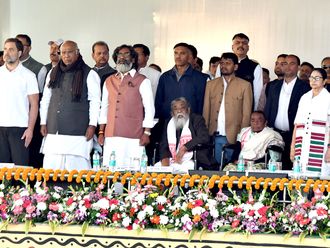Towering high on a hilltop near the city of Stirling stands The Wallace Monument, a tribute to the Scottish knight and landowner Sir William Wallace.
Unfortunately, he is often associated with the Australian actor Mel Gibson and his portrayal of Wallace in the highly-fictionalised Hollywood blockbuster Braveheart, which in turn is the film that has spawned a generation of Scots seeking independence for all the wrong reasons.
There is no reason why Scotland cannot stand on its own two feet as a modern, sovereign nation in today's highly-interconnected global economy. But when a referendum is held on independence — whether it be in 2014, the personal preference of Scotland's First Minister Alex Salmond, or earlier as British Prime Minister David Cameron so desires — Scots have to make their decision on the political, economic and social ramifications that a ‘Yes' or ‘No' answer would bring; let's keep aside for a moment the potential third "devo-max" option that would likely give Scotland greater fiscal autonomy
Scotland boasts a highly-educated citizenry but there is an element of the population that has been waiting for this opportunity to break away from the English for no other reason than a misplaced sense of nationalistic fervour.
Wallace obtained iconic status for his roles in the Wars of Scottish Independence in the late 13th and early 14th centuries. But this is not about defeating the English — in the manner of victories at Stirling Bridge and Bannockburn — rather it is about establishing Scotland as an independent state with control of its own finances and public services.
Reluctance to change
This is a battle for the 21st century with an entirely different scope and nature. Scotland has fared well as part of the UK since the Acts of Union 1707 were passed and has made an immense contribution to the world in terms of medicine, literature, science and beyond.
Therefore, it is understandable why thousands of Scots are reluctant to change. There is no shortage of reasons to be wary about going it alone at a time of great financial peril with countries across the globe struggling to rein in crippling levels of public debt; an age of austerity is sweeping across much of the western world.
Scotland will inherit a significant proportion of the UK's national debt should it become independent and there are also fears over whether it would be able to hold a prized AAA credit rating. It bodes well to remember, however, that Scotland is rich in natural resources and, in particular, generates substantial revenues from its North Sea oil and gas industry, which is though to have enough reserves to support the country for at least another 40 years.
Scotland is also diversifying its economy, especially in the field of renewable energy, as it seeks to move away from a dependence on oil. Alex Salmond signed an agreement with Abu Dhabi's Masdar earlier last week to develop green energy products, which included areas of collaboration on the development of offshore and onshore wind.
Dozens of reports containing all sorts of figures — ranging from EU membership, the economy and defence — have been brandished by either side of the independence debate. But in reality nobody is entirely sure how the economy of an independent Scotland would fare with so many issues still to be resolved, particularly over concerns such as taxation and currency.
In any case, the notion of Britishness as an identity has been diminishing for years on both sides of Hadrian's Wall. One poll released last week showed there is more support in England for Scottish independence than there is north of the border. That is not particularly surprising news but it is information that adds further credence to the argument for an independent Scotland.
English taxpayers have long been frustrated by two specific anomalies — namely the Barnett Formula, which allocates spending according to population size rather than the amount each country actually needs, and the so-called West Lothian Question, a term that refers to the fact that Scottish, Northern Irish and Welsh MPs can vote on legislation that affects only England.
There is now an opportunity to remove those barriers and allow Scotland, and England for that matter, to shape their own fiscal and monetary policies. England will remain Scotland's closest neighbour — not just in a geographical sense — in the event of independence. Thousands of Scots work in England, and particularly London, and they will continue to enjoy smooth transits through border controls en route to their ancestral homeland despite scaremongering to the contrary.
Stepping into the unknown is somewhat of a terrifying prospect but this is an increasingly uncertain world and the UK as a whole is not immune to the difficult economic challenges threatening global stability.
If the majority opts to stay in the Union, Salmond must respect the decision, which he has described as a ‘once-in-a-generation' opportunity. But Scots embraced devolution in 1997 and they have waited a long time for a long-overdue referendum on full independence.
It is not about ‘freedom' from the English as Mel famously roared all those years ago; it is about having the confidence to move forward as a sovereign state and country.










